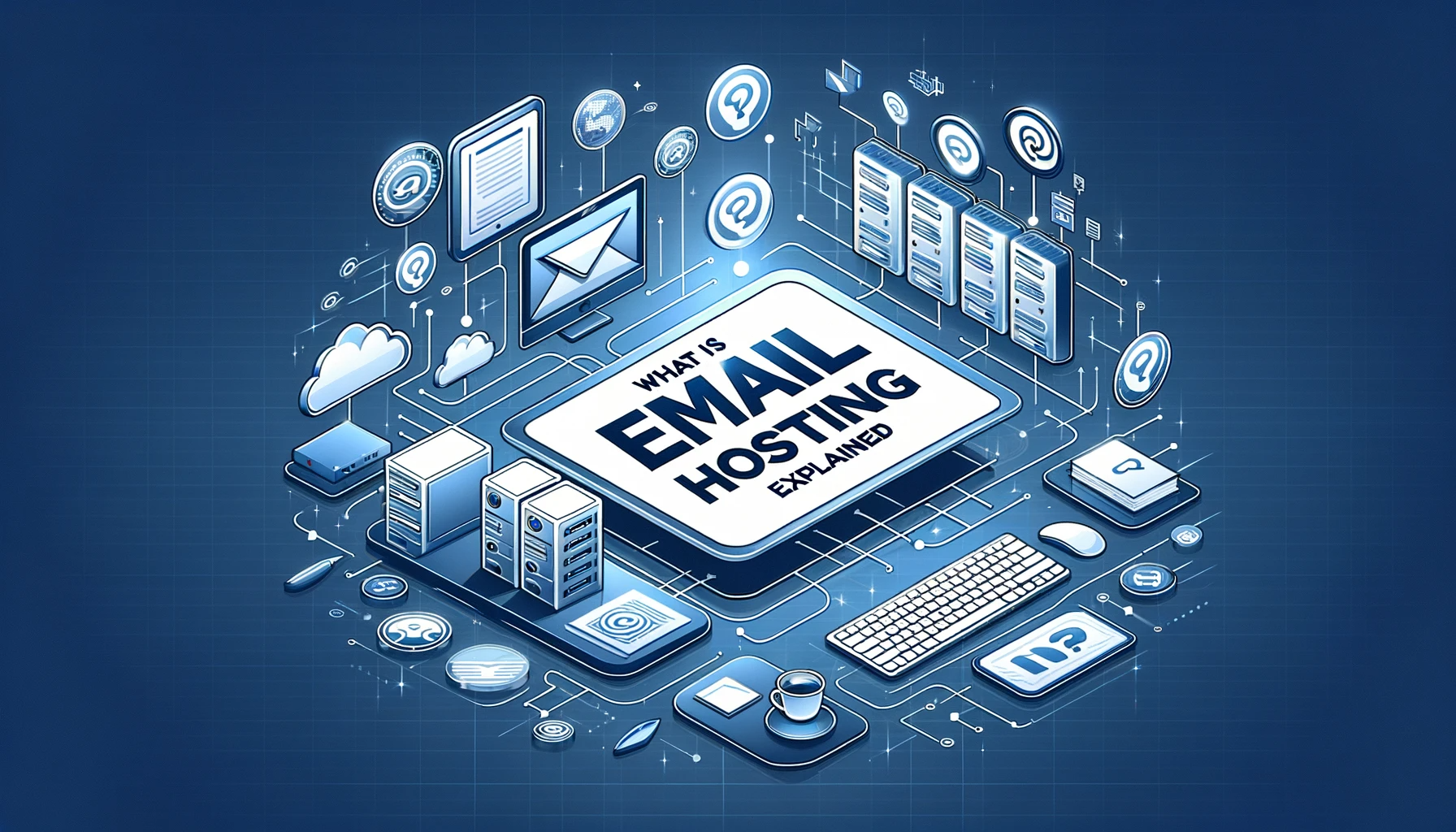Email hosting is a service that allows individuals and businesses to create and manage their email accounts using their own domain name. Unlike free email services like Gmail or Yahoo, email hosting provides a more professional and personalized solution. This article will explore what email hosting is and why it’s beneficial for individuals and businesses.
1. What is email hosting and its purpose?
Email hosting is a service provided by hosting companies that enables users to have their email accounts associated with their own domain name. Instead of using a generic email address like [email protected], email hosting allows you to use an address like [email protected].
The purpose of email hosting is to give individuals and businesses a more professional image. Having a personalized email address that matches your domain name can make a great impression on clients and customers. It also helps to build trust and credibility, as it shows that you are serious about your brand and have invested in its online presence.
2. The benefits of using email hosting services
There are several benefits to using email hosting services:
Customization: With email hosting, you have complete control over your email account settings. You can customize your email addresses, mailbox sizes, and security settings to meet your specific needs.
Security: Email hosting providers often offer advanced security features such as spam filtering, encryption, and virus protection. This helps to safeguard your emails and provides peace of mind knowing that your sensitive information is protected.
Reliability: Email hosting services are designed to provide reliable and uninterrupted email service. With guaranteed uptime and backup systems in place, you can be confident that your emails will always be accessible.
Scalability: Email hosting services can easily scale with your business. As your organization grows, you can add additional email accounts and increase mailbox sizes as needed.
In conclusion, email hosting offers a more professional and personalized solution for individuals and businesses who want to have their own custom email addresses associated with their domain name. The benefits of using email hosting services include customization, security, reliability, and scalability. By investing in email hosting, you can enhance your brand image and improve communication with your clients and customers.
How Email Hosting Works
1. Understanding the process of email routing and storage
Email hosting is a service that allows individuals and businesses to create and manage their own custom email addresses using their own domain. Essentially, it’s like having your own personalized email server. When you send or receive an email, it goes through a series of steps to reach its destination.
First, when you compose an email, it is sent from your email client (such as Microsoft Outlook or Gmail) to your email hosting provider’s server. From there, the email hosting provider routes the email to the recipient’s email hosting provider’s server. Finally, the email is delivered to the recipient’s email client where it can be read.
Email hosting providers also offer storage for your emails. This means that all your emails, both sent and received, are stored on the server provided by the hosting company. This allows you to access your emails from any device with an internet connection, keeping your emails organized and accessible.
2. The difference between regular email providers and email hosting providers
Regular email providers, such as Gmail or Yahoo, offer free email addresses using their own domain, such as @gmail.com or @yahoo.com. These providers often have limitations on storage space, number of emails, and may display ads in your inbox.
On the other hand, email hosting providers offer a more professional solution for businesses or individuals who want to have their own custom domain in their email address. With email hosting, you can have personalized email addresses that reflect your business or personal brand. You can also have more control over your email security, as you can set up spam filters and encryption options.
In summary, email hosting provides a personalized, professional email solution that allows individuals and businesses to have full control over their email addresses, domain, and storage. It offers a more secure and customizable option compared to regular email providers.
Choosing the Best Email Hosting Provider
When it comes to managing your business communications effectively, email hosting plays a crucial role in ensuring smooth and secure email operations. But what exactly is email hosting, and how do you choose the best email hosting provider for your business needs?
1. Factors to consider when selecting an email hosting provider
Reliability and Uptime: It is essential to choose an email hosting provider that guarantees reliable service with minimal downtime. Look for providers with a proven track record of high uptime percentages.
Security: With the increase in cyber threats, data security is a top concern. Ensure that your email hosting provider offers robust security measures such as encryption, spam filtering, virus protection, and backup services.
Scalability: As your business grows, you need an email hosting solution that can scale with your needs. Look for providers that offer flexible plans or the ability to upgrade your email hosting package easily.
Features and Integration: Consider the features that are important to you, such as multiple email account management, calendar syncing, file storage, and integration with other tools and software that your business uses.
Support: In case of any technical issues or queries, responsive and knowledgeable customer support is crucial. Look for providers that offer 24/7 support through various channels.
2. Top email hosting providers and their features
| Email Hosting Provider | Features |
|---|---|
| G Suite | – Integration with Google Apps – Ample storage space – Collaboration tools- Mobile access |
| Microsoft 365 | – Integration with Microsoft Office Suite- Advanced security features- Cloud-based storage- Multiple productivity tools |
| Zoho Mail | – Custom domain email addresses- Affordable pricing- Advanced email management features- Integration with Zoho suite of applications |
| FastMail | – Advanced spam filtering- Calendars and contacts synchronization- Powerful search features- Privacy-focused services |
When selecting an email hosting provider, evaluate your specific requirements and choose the one that aligns with your business needs and budget. It is important to review customer reviews and compare pricing and features before making a decision.
In conclusion, email hosting is a critical aspect of managing your business communications, and selecting the right provider is essential for ensuring reliable, secure, and scalable email operations.
Setting Up Email Hosting

1. Steps to set up professional email addresses on your domain
Setting up email hosting for your business domain is crucial to creating a professional image, enhancing communication, and building trust with your customers. Here are the steps to get started:
- Choose a reliable email hosting provider: Research and select a reputable email hosting provider that offers robust features, security, and reliable customer support.
- Register a domain: If you haven’t already, register a domain name that aligns with your business. It’s essential to have a unique and memorable domain.
- Set up your email accounts: Once you have a domain and an email hosting provider, you can create professional email addresses using your domain name. For example, [email protected]
- Configure DNS settings: To ensure that your email addresses work correctly, you need to update your domain’s DNS settings. This typically involves adding MX (Mail Exchanger) records to your DNS configuration.
- Choose an email client: You can access your professional email accounts using email clients like Microsoft Outlook or web-based solutions like Gmail or Yahoo Mail. Set up the email client to connect to your email hosting provider.
2. Configuring email settings for optimal performance
Once you have set up your professional email addresses, you can optimize the email settings for optimal performance and customization. Here are some essential configurations to consider:
- Secure your emails: Enable SSL/TLS encryption to protect the privacy and security of your email communications. This ensures that your data is encrypted during transit.
- Enable spam filtering: Implement a robust spam filtering system to reduce the amount of unwanted or malicious emails that reach your inbox.
- Set up email forwarding and autoresponders: Email hosting allows you to set up email forwarding to redirect incoming emails to other accounts. Additionally, you can create autoresponders to automatically reply to emails with pre-defined messages.
- Create email aliases: Email hosting often allows you to set up email aliases, which are alternative email addresses that can be used to receive emails without creating separate accounts.
By following these steps and configuring your email settings, you can establish a professional email presence for your business, improve communication efficiency, and build trust with your customers.
Email Hosting vs. Web Hosting
1. Differentiating between email hosting and web hosting services
When it comes to online communication for your business, email is essential. But did you know that email hosting is different from web hosting? Let’s break it down.
Email hosting refers to a service that provides you with the necessary infrastructure to send, receive, and store emails. It includes features such as email storage, spam filtering, virus protection, and synchronization across devices. With email hosting, you have your own professional email address (e.g., [email protected]) that is separate from your website domain.
On the other hand, web hosting is all about making your website accessible on the internet. It involves storing website files on a server and ensuring they are served to visitors when they access your site. Web hosting providers offer storage, bandwidth, and server resources to keep your website up and running smoothly.
2. The advantages of using separate hosting for email and website
There are several benefits to using separate hosting for your email and website:
Reliability: When you choose dedicated email hosting, you can expect a higher level of reliability and uptime compared to relying on web hosting for email. This ensures that your important business emails are always accessible and not affected by website downtime.
Security: Email hosting services come with advanced security measures such as spam and virus filtering. This helps protect your business from phishing attacks, malware, and other online threats. With separate hosting, you can better safeguard your sensitive email communications.
Scalability: By using dedicated email hosting, you have the flexibility to scale your email storage and resources as your business grows. You won’t have to worry about limited server space or slow email performance due to heavy website traffic.
Professionalism: Having a professional email address that matches your domain (e.g., [email protected]) adds credibility and builds trust with your customers. It conveys a more professional image compared to using a generic email address (e.g., [email protected]).
In conclusion, email hosting and web hosting serve different purposes for your business. Separate email hosting provides reliability, security, scalability, and professionalism for your email communications. By understanding the differences and advantages, you can make informed decisions to enhance your online presence and communication efficiency.
Security and Reliability in Email Hosting
1. Ensuring data security and protection in email hosting
In today’s digital age, email is a vital communication tool for businesses. As such, it is crucial to prioritize data security and protection in email hosting. Email hosting providers offer advanced security measures to safeguard your sensitive information and prevent unauthorized access. These measures include encryption protocols, spam filters, virus scanning, and firewalls to protect against malware and phishing attacks.
By using email hosting services, your data is stored in secure servers maintained by the hosting provider. This ensures that your emails are protected from potential threats and that your confidential information remains confidential. Additionally, most email hosting providers offer backup and disaster recovery options to prevent data loss and ensure business continuity.
2. How email hosting providers guarantee reliability and uptime
Email hosting providers also prioritize reliability to ensure that your business emails are accessible and functional at all times. They employ redundant infrastructure and implement server monitoring and maintenance protocols to maximize uptime and minimize service disruptions. This means that your emails will be available to you and your clients whenever you need them.
Additionally, email hosting providers offer features like scalable storage, allowing you to increase storage capacity as your business grows. They also provide user-friendly interfaces and integration options with other business tools and applications, enhancing productivity and efficiency.
With email hosting, you can customize your email addresses with your domain name, showcasing professionalism and reinforcing your brand identity. This also helps in building credibility and trust among your recipients.
In summary, email hosting not only ensures data security and protection but also guarantees reliability and uptime for your business emails. By entrusting your email hosting to a reliable provider, you can focus on your core business activities while enjoying the benefits of a secure and efficient communication channel.
Conclusion
1. Recap of the importance and benefits of email hosting
In today’s digital age, having a professional email address is crucial for businesses of all sizes. Email hosting provides a reliable and secure solution for businesses to manage their email communications. By using a dedicated email hosting service, businesses can enjoy several benefits, including:
- Enhanced security: Email hosting services offer robust security measures to protect sensitive information, such as encryption and spam filters, reducing the risk of data breaches and unauthorized access.
- Custom domain: With email hosting, businesses can create email addresses that are personalized and branded with their domain name, presenting a more professional image to clients and customers.
- Increased storage and scalability: Unlike free email providers, email hosting services offer ample storage space for emails and attachments, allowing businesses to store and organize their communications effectively. Additionally, email hosting can scale as a business grows, accommodating increased email traffic and storage needs.
- Business continuity: Email hosting services often provide backup and disaster recovery features, ensuring that emails are backed up regularly and can be restored in the event of data loss or system failure.
2. Final thoughts on choosing the best email hosting solution
When selecting an email hosting solution for your business, it is essential to consider several factors. These may include:
- Reliability and uptime: Look for a service provider that offers a high level of reliability and uptime, ensuring that your email service is consistently available.
- Security features: Choose a provider that prioritizes security and offers comprehensive measures, such as encryption and spam filters, to protect your emails and data.
- Scalability: Consider your business’s growth potential and ensure that the email hosting solution can accommodate your future needs.
- Support and customer service: Select a provider that offers reliable customer support, should you encounter any issues or require assistance.
By carefully evaluating these factors and choosing a reputable email hosting provider, businesses can ensure a smooth and efficient email communication system that reflects professionalism and enhances productivity.
Remember, email hosting is more than just having a dedicated email address. It is the foundation for effective and secure communication within your business and with your clients and customers. Take the time to invest in the right email hosting solution for your business and enjoy the benefits it brings.



